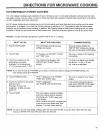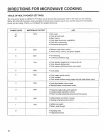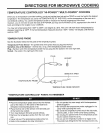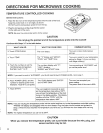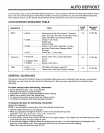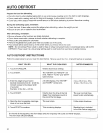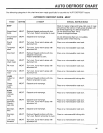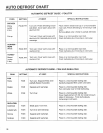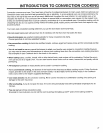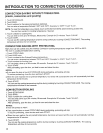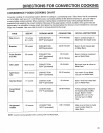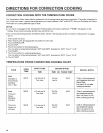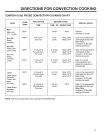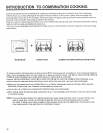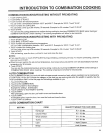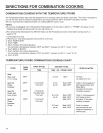
iNTRODUCTiON TO CONVECTION COOKING
Convection ovens are not new. They have been a favorite of professional bakers for many years. Both conventional and
convection ovens cook food with heat generated by gas or electricity. In a conventional oven, air remains stationary; the
heat rises to the top of the oven and is not evenly distributed throughout the oven interior. In a convection oven, a fan
circulates the warm air. The continuous flow of warm air around food in a convection oven causes it to be cooked more
evenly and somewhat faster than it can be cooked by motionless air in a conventional oven. Convection cooking, with its
circulating hot, dry air, is a superb cooking method for baked goods, roasts, poultry and other foods that require a crisp,
browned surface.
Your oven uses convection cooking whenever you use the Convection Command Pads.
®Do not cover baking rack with aluminum foil. It interferes with the flow of air that cooks the food.
®Round pizza pans are excellent cooking utensils for many convection-only items.
Choose pans that do not have extended handles.
o Use convection cooking for items like souffles, breads, cookies, angel food cakes, pizza, and for some meat and fish
cooking.
o You do not need to use any special techniques to adapt your favorite oven recipes to convection cooking; however,
you may need to lower some temperatures or reduce some cooking times from the convection oven cooking directions.
See examples in your Cookbook and in the charts in this section.
o When baking cakes, cookies, breads, rolls or other baked foods, most recipes call for preheating. Preheat the empty
oven just as you do a regular oven. You can start heavier dense foods such as meats, casseroles, and poultry without
preheating.
e All heatproof cookware or metal utensils can be used in convection cooking.
• As in conventional cooking, the distance of the food from the heat source affects cooking results. Follow Cookbook
recipes and refer to the charts in this Use and Care Guide. It is also helpful to find a similar recipe in the Cookbook
index and to refer to the recipe's suggested techniques.
• Use metal utensils only for convection cooking. Never use for microwave or combination cooking since arcing and
damage to the oven may occur.
• After preheating, if you do not open the door, the oven will automatically hold at the preheated temperature for 30
minutes.
• You can set up to three convection cycles.
(Example for two crust pies: you can set the oven to preheat for baking at 425°F and to finish baking at 350°F.)
27



